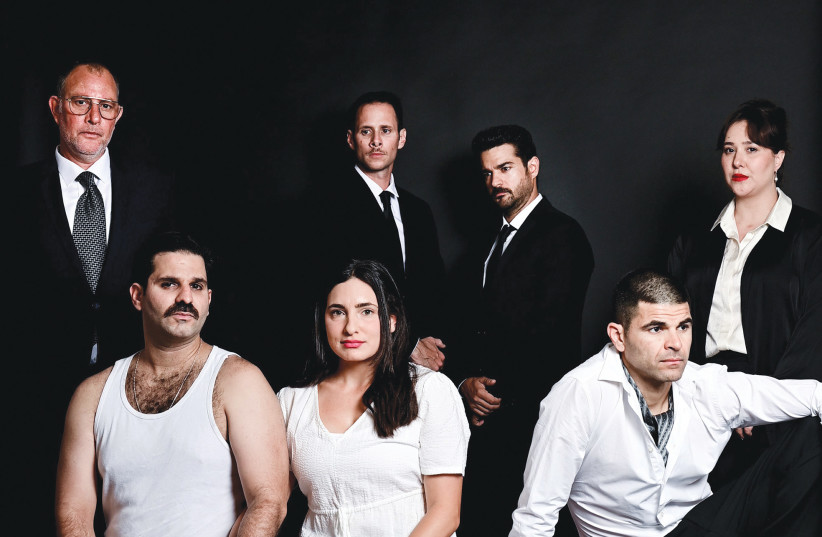This year, Acre’s Acco Festival of Alternative Israeli Theatre will present performances dealing with post-war and post-rape trauma; the social climate of our currently divided society; democracy; issues of aging and loss; and rethinking the wrongs of Israel’s past.
“Even remembering the first slow dance in our teens,” said Dalia Shimko, the artistic director of the annual festival, which takes place during Sukkot (October 1-4) in Acre’s enchanting Knights’ Halls.
“The 44th edition of Acco Festival of Alternative Israeli Theater reflects in its essence a wide range of voices, focusing on social and existential issues,” said Shimko.
A celebration for theater lovers, the festival gives front places to artists and writers, and especially alternative creators – providing opportunities and opening doors to different and new ideas.
What's being shown at the festival?
The festival will hold a tribute night to Yaakov Agmon for the second year. He was, as Shimko said, “A pillar of the Israeli Theater who was the artistic director of the Acco Festival in the 1990s.” His wife, actress Gila Almagor-Agmon, will present the Agmon Prize to the winner chosen by the artistic committee.

The festival will present 20 varied theater performances, of which 14 are original plays, among them: eight premieres, six plays from the Acco creative hub for promising directors and writers, four are visiting plays, and for the younger crowds there will be Chinese Shaolin monks who will put up a Kung Fu show.
There will also be this year other international groups hailing from the Czech Republic, Austria, Switzerland, and Spain.
The festival takes over the old city of Acre, presenting about 40 street shows and special events that are free and will take place every evening from 6 p.m. in the alleyways of Acre.
Shimko said: “In the midst of this [political storm], I believe that continuing to create is absolutely necessary, for the creators and for the audiences. The talented work that continues to boil under the surface brings a little comfort, a sense of togetherness and normality, and reminds us why we are here and what we love so much about our demanding homeland,” at a press conference announcing the festival’s program.
“The country is burning and the general mood has totally become our private mood too. The private and the collective are completely entwined with each other,” she said.
The eight plays in the competition differ from each other in genre and in content.
Dealing with the wrongs of our past, A Shot in the Wadi – The Trial of David Ben Harosh, by Roy Malka, is based on the trial transcripts of David Ben-Harosh, who was the leader of the Wadi Salib riots in 1959 – a series of violent demonstrations that took place in the Wadi Salib neighborhood of Haifa, sparked by the police shooting of an immigrant from Morocco. Demonstrators accused the police of ethnic discrimination against Mizrahi Jews.
Another play, The Hourglass, deals with issues of age and loss. The first play by 88-year-old veteran actress Rivka Gur, who also stars in the play, is about an old man who wishes to end his life but the spirits of his late wife, father, and unborn child convince him not to.
Ménage à trois, a new production by Theater Gallery Hachanut, talks about a visit to Mrs. Levine’s Museum of Automats, a collection of machines that tell the story of a passionate woman with an obsession for developing killing machines.
School Party: The First Slow Dance goes back to memories many share, not of the first kiss, but the first dance, or more specifically slow dance. The play is a research experience that deals with social conventions and fears connected to puberty. It is based on stories collected from hundreds of people, and the creators invite the audience to share their stories and add to the play.
Amiram is about a young father who works as a repairman and lives a mundane life until one morning he wakes up knowing that he is destined to commit an extreme act. He deliberates but his inner voice tells him he must do it, and disaster is about to break loose.
Or LaGoyim (spelling Or with the Hebrew letter ayin instead of alef, making the meaning “skin” not “light”), is a spoken-word play by Yossi Zabari.
Falling Apart Inside is performed by three actresses. The play deals with the traumatic effects of rape on a woman and allows her voice to be heard.
“I was 15 when I was raped at a school party. Five years later, through flashbacks, I began to understand what had happened to me,” writes the playwright Hila Tomer. Three actresses embody her, confronting the rapist in an attempt to gain control over her life.
Mangalic Passport – A Pathetic Satire on the Promised Land is Fauda’s star Ala Dakka’s first play, in which he portrays the leading character, Watan, alongside actress Hanna Azoulay-Hasfari as his mother. It deals with the prospects, or the lack of, for a young Arab Israeli man in Israel. Watan is not usually a lucky person, but one day he discovers that he was chosen to become a citizen of a new and developing island nation called Mangal. He decides to go on a trip to get the passport, a journey that will confront him about everything he knows.
The visiting plays include the special world premiere of a project called Grounded, by Shay Cohen who hails from Berlin, where she works and resides. Grounded is a sweeping show that takes spectators deep into the human experience.
For those wishing to stay in Acco, special accommodation offers with be available during the festival at a camping area, at many hotels, hostels, and others.
For more details and tickets go to accofestival.co.il
